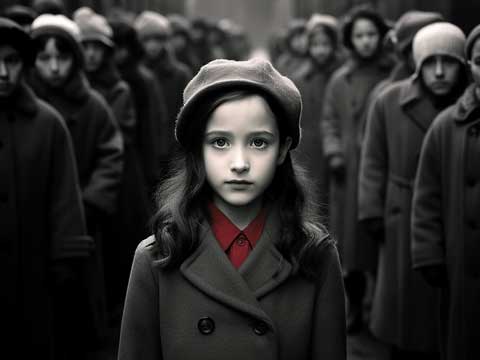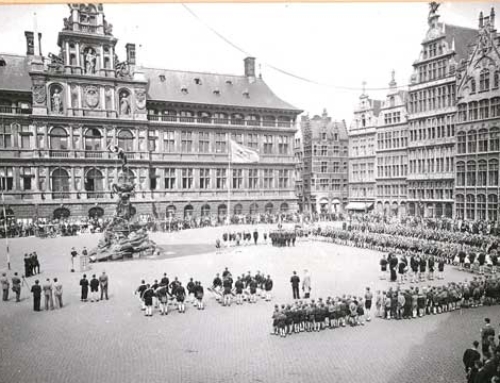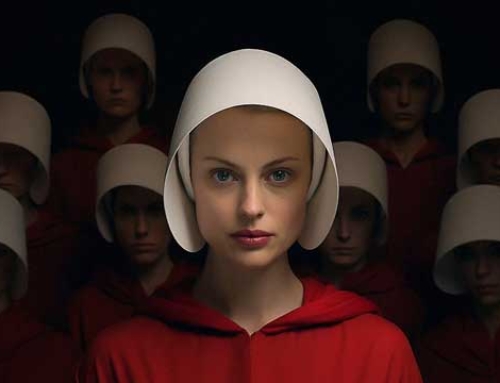Holocaust films, shedding light on a dark period in our history, continue to touch and challenge us to this day. Picture this: between 1941 and 1945, millions of Jews were horrifically persecuted and murdered by the Nazi regime. This era of unprecedented horror, captured in countless films, has not only changed the course of world history but has also profoundly influenced our perspective on themes such as genocide, human rights, and tolerance.
The power of film: a glimpse into the past
After World War II, the film industry played a key role in telling these stories. Holocaust films are more than art; they are educational tools and a way to keep this dark period in our history alive. Through the camera lens, we get a glimpse into the lives of the victims and survivors, helping us truly understand the unimaginable tragedies they endured.
From documentaries striving for historical accuracy to dramatic narratives exploring the emotional and psychological impact of the Holocaust, these films span a wide range. In this article, we delve into the various ways the Holocaust has been depicted in films, how these portrayals have evolved over time, and how they are perceived by both the general public and the survivors themselves. We also discuss the balance between artistic interpretation and historical responsibility in Holocaust films.
Early narratives: the impact of ‘Schindler’s List’
Let’s start with the early films, like Steven Spielberg’s ‘Schindler’s List’ from 1993. This film was a game-changer in how the Holocaust was portrayed in cinema. Spielberg’s approach was raw and emotional, telling the true story of Oskar Schindler, who saved over a thousand Jewish refugees. Shot in black and white, the film emphasized the horrors and human suffering during this dark period. ‘Schindler’s List’ is often praised for its historical accuracy and its ability to evoke a deep emotional response from the audience.
A new direction in Holocaust films: personal stories in the spotlight
Over the years, we’ve seen a shift to more personal and intimate stories, like Roman Polanski’s ‘The Pianist’ from 2002. This film tells the true story of Wladyslaw Szpilman, a Polish Jewish pianist who survived the occupation of Warsaw. Unlike ‘Schindler’s List’, ‘The Pianist’ focuses more on individual struggle and survival. Polanski, himself a Holocaust survivor, brought a deeply personal perspective to the film.
Then there’s ‘Life Is Beautiful’ (‘La Vita è Bella’) by Roberto Benigni from 1997, a film that took a unique and controversial approach by blending comedy with the tragic story of a Jewish Italian bookkeeper in a concentration camp. Despite criticism for its lighter tone, the film was also praised for its original approach and its ability to find hope and humanity in the most hopeless of circumstances.
These films show how the portrayal of the Holocaust in the film industry has evolved from large-scale historical narratives to more personal, intimate stories that highlight the complexity and human aspects of this tragic period.
The filmmakers’ dilemma: balancing fact and fiction
But what about the balance between entertainment and education? Filmmakers tackling the Holocaust face the challenge of creating an engaging, commercially viable product that also respectfully and accurately represents historical events. This raises questions about the responsibilities of filmmakers. Should they focus on telling a compelling story to reach a broad audience, or should they adhere strictly to historical facts?
Take ‘Life Is Beautiful’ as an example. Roberto Benigni’s choice to use humor and lightness in the context of a concentration camp led to divided reactions. Some praised the film for its unique perspective, while others criticized it for potentially trivializing the Holocaust. This highlights the complexity of the subject and the delicate balance filmmakers must find between artistic freedom and historical responsibility.
The role of artistic interpretation in Holocaust films can lead to powerful, emotionally resonant works, but also raises questions about the limits of this freedom. Where is the line between telling a story in a way that engages the audience and disrespectfully handling the reality of the events? This question remains a central point of discussion in the film world, especially on topics like the Holocaust.
Global impact of Holocaust films: responses from viewers and survivors
Holocaust films often have a profound impact on the general public. For many, these films provide a window into a historical period they may only know from books or education. The visual and emotional power of film can create a stronger, more personal connection with the events of the Holocaust. However, the way these films are received can vary greatly.
The responses of Holocaust survivors to films about this period are particularly important and often complex. For some, these films can be a means to process or share their own experiences. The authenticity of the portrayal is crucial here. The emotional impact of these films on survivors can be enormous. Some may find it too painful to watch these films, while others appreciate them for helping to raise awareness and understanding of the Holocaust.
It’s important to recognize that survivors are not a homogeneous group and that their reactions to Holocaust films can vary greatly. Some may be critical of how certain films approach or depict certain aspects of the Holocaust, while others may appreciate the artistic interpretation and the effort to make this complex history accessible to a broad audience.
Responsibility and respect: the role of holocaust film creators
Films play an essential role in preserving and passing on the memory of the Holocaust. They serve as powerful means to keep this dark period in human history alive, especially for generations that have no direct connection to the events. By visualizing and personalizing stories, films help keep the memory of the Holocaust accessible and relevant to a global audience.
The responsibility of filmmakers in accurately and respectfully depicting the Holocaust cannot be understated. It’s crucial that films about the Holocaust serve not only as artistic expressions but also as faithful representations of historical events. This requires a careful balance between creative freedom and historical responsibility, with respect for the victims and survivors at the forefront.
Besides providing entertainment, Holocaust films also have an educational value. They play an important role in educating the public about the complexity and consequences of the Holocaust. By creating awareness and empathy, these films contribute to a greater understanding of the need to combat intolerance, discrimination, and genocide.
In light of these considerations, the production of films about the Holocaust remains an important task. They are not just works of art but also essential tools in educating about and remembering one of the most tragic periods in human history. It’s the duty of filmmakers, viewers, and educators to ensure that these stories are treated with the necessary care and respect and passed on to future generations.







